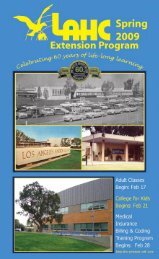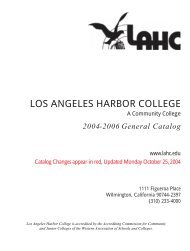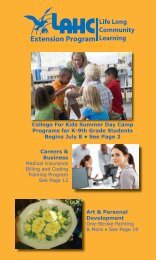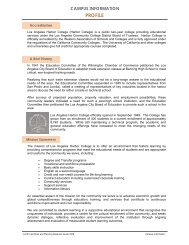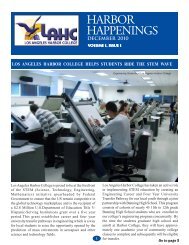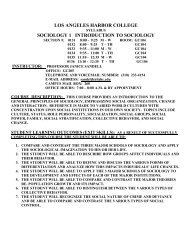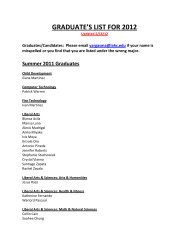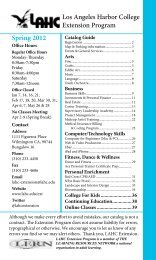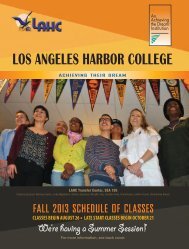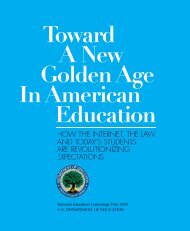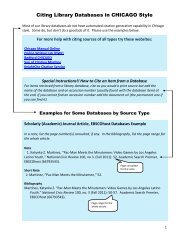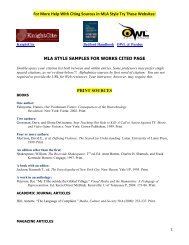Download File - Los Angeles Harbor College
Download File - Los Angeles Harbor College
Download File - Los Angeles Harbor College
You also want an ePaper? Increase the reach of your titles
YUMPU automatically turns print PDFs into web optimized ePapers that Google loves.
ceramics instructor.<br />
713 - BEGINNING CERAMICS I (2 UNITS)<br />
UC:CSU<br />
This course deals with the fundamentals of ceramic<br />
materials, processes, decorative treatment, wheel<br />
throwing, and other shaping methods. Firing and glazing<br />
are included.<br />
714 - BEGINNING CERAMICS II (2 UNITS)<br />
UC:CSU<br />
This course provides a further study of ceramics its<br />
materials, design, and production. More emphasis is put<br />
on glazes and kiln firing.<br />
ASTRONOMY<br />
1 - ELEMENTARY ASTRONOMY (3 UNITS)<br />
UC:CSU<br />
This course introduces scientific methods used to<br />
determine the nature of our universe. A planetarium is<br />
used to demonstrate planetary motion, star patterns and<br />
constellations.<br />
5 - FUNDAMENTALS OF ASTRONOMY<br />
LABORATORY (1 UNIT) UC:CSU<br />
Prerequisite: Completion of Astronomy 1 with a grade of “C” or better<br />
or concurrent enrollment.<br />
This course introduces scientific methods used to determine<br />
the nature of our universe. Course work includes the use<br />
of astronomical instruments in a laboratory setting. A<br />
planetarium is used to demonstrate planetary motion, star<br />
patterns and constellations.<br />
BIOLOGY<br />
Also refer to courses in Anatomy, Microbiology,<br />
Oceanography, and Physiology.<br />
3 - INTRODUCTION TO BIOLOGY (4 UNITS)<br />
UC:CSU<br />
In this lecture and laboratory course for non-majors,<br />
students learn general biological principles, activities, and<br />
the relationships of living organisms to each other and the<br />
world they live in with emphasis on their correlations to<br />
the human organism. The course includes a study of the<br />
nutritional, medical, and genetic aspects of the modern<br />
world.<br />
5 - INTRODUCTION TO HUMAN BIOLOGY<br />
(4 UNITS) UC:CSU<br />
This is an introductory lecture and laboratory course for<br />
non-majors that includes the study of basic biological<br />
principles; introduction to basic human anatomy,<br />
physiology and microbiology. Human development and<br />
heredity, evolution, ecology, bioethics of molecular<br />
genetics are also covered.<br />
33 - MEDICAL TERMINOLOGY (3 UNITS) CSU<br />
This course develops a comprehensive medical vocabulary<br />
applicable to all specialties of medicine, through learning<br />
Greek and Latin prefixes, suffixes, and word roots.<br />
Training in the spelling, pronunciation, and definition of<br />
medical terms and abbreviations is provided, as well as in<br />
the use of a medical dictionary.<br />
101 - BIODIVERSITY AND ENVIRONMENTAL<br />
BIOLOGY (5 UNITS) UC:CSU<br />
Prerequisite: Completion of Chemistry 101 with a grade of “C” or<br />
better or concurrent enrollment.<br />
This is the first course of a three-course lecture and<br />
laboratory sequence for Biology majors, including Biol<br />
101, 102, and 103. It includes the scientific method, cell<br />
structure and function, biodiversity, including major taxa<br />
and their ecological and morpholological relationships,<br />
behavioral, population community and ecosystem ecology,<br />
and distribution and adaptations of organisms. It includes<br />
field trips and library research. The degree of rigor and<br />
the amount of independent learning are designed to meet<br />
the preparation needs of students pursuing upper division<br />
biology, medicine, dentistry, public health, veterinary<br />
medicine, etc.A materials fee is required.<br />
102 - MOLECULAR CELL BIOLOGY AND<br />
EVOLUTION (5 UNITS) UC:CSU<br />
Prerequisite: Completion of Biology 101 and Chemistry 101 with<br />
grades of “C” or better.<br />
This is the second course of a three-course lecture and<br />
laboratory sequence for Biology majors, including<br />
Biol 101, 102, and 103. Introduction to biological<br />
molecules, cell function, including transport, enzymes, and<br />
biochemical pathways; cell cycle, cell division, life cycles,<br />
Mendelian genetics, the chromosomal and molecular bases<br />
of inheritance, flow of genetic information and mutations;<br />
evidence and mechanisms of evolution. The degree of rigor<br />
and the amount of independent learning are designed to<br />
meet the preparation needs of students pursuing upper<br />
division biology, medicine, dentistry, public health,<br />
116 * Course Descriptions <strong>Los</strong> <strong>Angeles</strong> <strong>Harbor</strong> <strong>College</strong>



